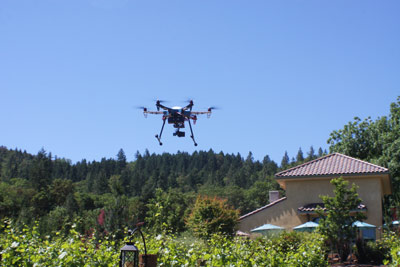Let’s Talk Real Estate – September 2014
Prior to moving to Southern Oregon in 2002, I had just sold eBusiness Design, a web development company that specialized in helping large companies use the internet to market, improve customer service, distribute their product directly to consumers or just to inform their customers. When I arrived in Southern Oregon, I was surprised by the lack of the awareness of the internet as a marketing tool and quickly became successful in real estate sales by using the internet to market homes for sale.
Fast-forward to 2014—marketing homes using the internet has evolved to the next level and has changed in three major ways. We are now seeing incredible growth and success using Video, Mobile and Texting.
Video—For years, the best way to capture the feeling of your home has been a video, but we are now seeing rapid growth of this technology due to the majority of the population having high-speed internet, smart phones hooking to WiFi and the use of Drones to capture High Definition photos from the air. Drones are no longer just associated with unmanned flights tracking terrorists through desolate foreign territories. Drones are now being used to fly over your home, capturing images that fascinate the viewers. You can have footage of flying over your community and capturing its best features then combine that with a flyover and through your home. Take Jacksonville for example: many buyers come here from out of state so they are amazed when they see a flyover of Britt, California Street, local vineyards, wineries and historic buildings combined with a home that fits their needs.
Mobile—According to the National Association of Realtors, 89% of home shoppers use mobile devices during their home buying research with the number growing daily. The top three real estate websites, Realtor.com, Zillow and Trulia, are already receiving more traffic from their mobile applications than their desktop applications, so it’s really become important for a home that is for sale to be advertised and enhanced on one, if not all three of those sites. Mobile real estate sites use the GPS on your smart phone to bring up homes that are for sale as buyers drive past them. If there is a video they can launch and play, they can quickly see both the inside and outside. If it is done using a drone, they can see the neighborhood and if it’s rural property, they can see the lay of the land. With one click from a mobile application, a buyer can call the listing agent for an appointment to see the home. If an agent has a website they have to make sure that website is optimized for mobile users or many buyers will not be able to view their homes for sale.
Texting—Text codes are a fantastic way to capture the contact information of mobile drive-by buyers. A text code can be added to a “for sale” sign allowing buyers to text for price, details, photos and videos. Many drive-by shoppers may not be ready to call the listing agent, but they will send a text for additional information. The listing agent will instantly be notified by text or email when a buyer uses the text code and can then reach-out and text (or call) the buyer back while the buyers is still sitting in front of the house for sale! Text codes can also be used as lead generators in any advertisement. Print ads don’t allow for many details so if you add a text code, the buyer can text for complete details, video and photos. Recently, I saw the use of text codes by Sears in the Sunday paper and you will definitely see more use of this technology as the public embraces it.
It’s interesting how technology adds new ways we can market homes but we have to combine these new technical marketing tools with those old and trustworthy marketing tools such as print ads, direct mail and open houses, which are still great ways to find a buyer for a home.
